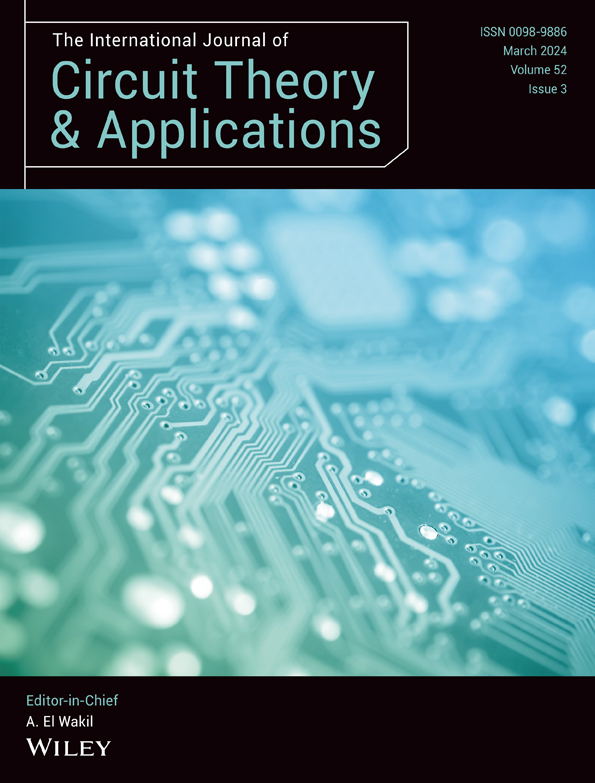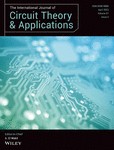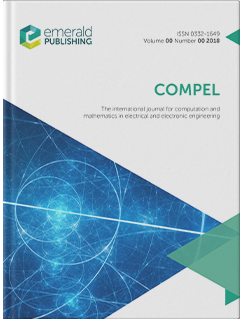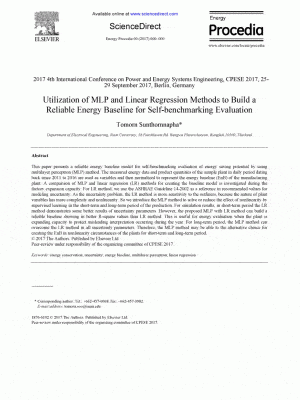
On the analytical modeling of fractal memelement and inverse memelement (2024)
Title : On the analytical modeling of fractal memelement and inverse memelement
Researcher : Banchuin, R.
Department : Faculty of Engineering, Siam University, Bangkok, Thailand
Email : rawid.ban@siam.edu
Abstract : In this work, an improved analytical model of fractal memelement in which the pinched point shifting has been considered and the original analytical model of fractal inverse memelement have been proposed. These fractal circuit elements are the memelement, and inverse memelement operates based on the principle of electromagnetic in fractal time/space, which must be applied whenever the current flows through fractal media. These models are important because these memory elements can be realized based on the porous material, which is a fractal media. In addition, they can employ self-similarity, which is hard to be simulated by using the traditional models. This is because such self-similarity can be well explained by the fractal set-based model, yet those traditional models are based on the set of real values. Therefore, for deriving the proposed models, the fractal calculus, which is oriented to the fractal set, has been adopted as the mathematical basis. From the analytical and numerical analyses based on the derived models, it has been found that both memelement and inverse memelement can retain their unique frequency characteristics despite being operated based on the abovementioned principle. In addition, their input–output relationships are mathematically differentiable albeit the inputs and outputs themselves are not.
Link to article : International Journal of Circuit Theory and Applications, Version of Record online: 26 March 2024 https://doi.org/10.1002/cta.4023
Journal : International Journal of Circuit Theory and Applications / in Scopus
Bibliography : Banchuin, R. (2024, March 26). On the analytical modeling of fractal memelement and inverse memelement. International Journal of Circuit Theory and Applications, Version of Record online. https://doi.org/10.1002/cta.4023

On The Fractional Domain Analysis of HP TiO2 Memristor Based Circuits with Fractional Conformable Derivative (2021)
Title : On The Fractional Domain Analysis of HP TiO2 Memristor Based Circuits with Fractional Conformable Derivative
Researcher : Banchuin, R.
Department : Faculty of Engineering, & Graduated School of IT, Siam University, Bangkok, Thailand
Email : rawid.ban@siam.edu
Abstract : For the first time, the physical memristor-based circuits i.e., HP TiO2 memristor-based circuits, of both series and parallel structures, have been extensively analyzed in the fractional domain by means of the state of the art yet simple fractional conformable derivative-based differential equations. Different outcome from the hypotheticalmemory element-based previous researches have been obtained. The dimensional consistencies of the fractional derivatives have also been concerned. The often-cited Joglekar’s window function has been adopted for modelling the boundary effect of the memristor and adding more nonlinearity close to the bounds of the memristor’s state variable. The formulated fractional differential equations have been solved and the related electrical quantities have been determined. The computational simulations have been performed. The stability analyses of both circuits have also been presented where it has been mathematically verified that only these HP TiO2 memristor-based circuits are stable always due to the boundary effect which does not exist in hypothetical elements assumed in those previous works. We also point out that that only those HP TiO2 memristor-based circuits of order higher than 3 are capable to exhibit the complex dynamics as such memristor lacks the local activity.
Link to article : Cogent Engineering, 2021, 8(1), 1986198. https://doi.org/10.1080/23311916.2021.1986198
Journal : Cogent Engineering / in Scopus
Citation : Banchuin, R. (2021). On the fractional domain analysis of HP TiO2 memristor based circuits with fractional conformable derivative. Cogent Engineering, 8(1), 1986198. https://doi.org/10.1080/23311916.2021.1986198
ฐานข้อมูลงานวิจัย มหาวิทยาลัยสยาม : https://e-research.siam.edu/kb/on-the-fractional-domain/

On the fractional domain analysis of negative group delay circuits (2024)
Title : On the fractional domain analysis of negative group delay circuits
Researcher : Banchuin, R.
Department : Faculty of Engineering, Siam University, Bangkok, Thailand
Email : rawid.ban@siam.edu
Abstract : In this work, the analysis of negative group delay circuits in fractional domain has been conducted. The low pass and the high pass negative group delay circuits constructed based on passive network have been chosen as our candidate circuits. For performing the analysis in fractional domain, the novel Caputo–Fabrizio derivative-based fractional impedance have been introduced to both circuits. The crucial parameters, the necessary conditions, and the existence conditions of both candidate negative group delay circuits have been formulated. The simulations have been conducted based on the formulated results where the comparisons with the conventional prototypes have been made. The verifications by the proof-of-concept circuits have also been performed. In addition, the effects of variation in the order of fractional impedances have been investigated. In summary, it has been found that considering these negative group delay circuits in the fractional domain, which effectively taking unavoidable nonidealities that cannot be modeled in conventional domain into account, significantly alters their characteristics especially the low pass circuit. However they can retain their low pass and high pass negative group delay functions.
Link to article : International Journal of Circuit Theory and Applications, 2024, 52(3), pp. 1531–1546 https://doi.org/10.1002/cta.3819
Journal : International Journal of Circuit Theory and Applications / in Scopus
Bibliography : Banchuin, R. (2024). On the fractional domain analysis of negative group delay circuitsd. International Journal of Circuit Theory and Applications, 52(3), 1531–1546 https://doi.org/10.1002/cta.3819

On the noise performances of fractal-fractional electrical circuits (2023)
Title : On the noise performances of fractal-fractional electrical circuits
Researcher : Banchuin, R.
Department : Faculty of Engineering & Graduated School of IT, Siam University, Bangkok, Thailand
Email : rawid.ban@siam.edu
Abstract : In this work, the noise performances of the fractal-fractional electrical circuits have been addressed. The nonlocal fractal calculus has been adopted as our mathematical basis. The fractal time component has also been included for the physical measurability of electrical quantities. The derivations of crucial stochastic parameters of circuit responses, which determine their noise performances, have been performed. Numerical simulations have also been conducted where the influences of Hausdorff dimension of the fractal set, orders of fractal-fractional reactive components, and other parameters on the noise performances have been studied. Regardless to any specific circuit, we have found that the noise performances can be improved by increasing the orders of fractal-fractional reactive components. The optimum Hausdorff dimensions, which the best noise performances can be achieved given the orders of fractal-fractional reactive components, have also been calculated. The results proposed in this work serve as the foundation for understanding noise in fractal-fractional electrical circuits and can be extensively applied to large-scaled circuits, for example, the infinite circuit networks and so forth.
Link to article : International Journal of Circuit Theory and Applications, 2023, 51(1), pp. 80–96. https://doi.org/10.1002/cta.3407
Journal : International Journal of Circuit Theory and Applications / in Scopus
Bibliography : Banchuin, R. (2023). On the noise performances of fractal-fractional electrical circuits. International Journal of Circuit Theory and Applications, 51(1), 80–96. https://doi.org/10.1002/cta.3407
ฐานข้อมูลงานวิจัย มหาวิทยาลัยสยาม : https://e-research.siam.edu/kb/on-the-noise-performances/

On the test of novel constitutive relation of capacitor for electrical circuit analysis: a fractal calculus-based approach (2023)
Title : On the test of novel constitutive relation of capacitor for electrical circuit analysis: a fractal calculus-based approach
Researcher : Banchuin, R.
Department : Faculty of Engineering, & Graduated School of IT, Siam University, Bangkok, Thailand
Email : rawid.ban@siam.edu
Abstract :
Purpose
Design/methodology/approach
Findings
Originality/value
Link to article : COMPEL – The International Journal for Computation and Mathematics in Electrical and Electronic Engineering, 2023, 42(2), pp. 506–525. https://doi.org/10.1108/COMPEL-04-2022-0143
Journal : COMPEL – The International Journal for Computation and Mathematics in Electrical and Electronic Engineering / in Scopus
Citation : Banchuin, R. (2023). On the test of novel constitutive relation of capacitor for electrical circuit analysis: a fractal calculus-based approach. COMPEL – The International Journal for Computation and Mathematics in Electrical and Electronic Engineering, 42(2), 506–525. https://doi.org/10.1108/COMPEL-04-2022-0143

Optimal Scheduling of Variable Speed Pumps in Mahasawat Water Distribution Pumping Station (2017)
Title : Optimal Scheduling of Variable Speed Pumps in Mahasawat Water Distribution Pumping Station
Researcher : Tomorn Sunthornnapha
Department : Department of Electrical Engineering, Siam University
E-mail : tomo.soo@siam.edu
Abstract : An optimum energy conservation technique for water treatment plant, both in term of costs and environmental impacts, have been studied and implemented primarily at Mahasawat Water Distribution Pumping Station, Thailand. This article proposes an optimum scheduling of 4-variable speed pumps operating under their actual conditions. We apply affinity laws with simple measures of performance; delivery pressure, power, and speed; to a group of pumps before scheduling them in parallel as 4-3-2 pump configuration. Energy costs are computed in term of specific energy consumptions (SEC’s) to compare them for all configurations. This proposed technique is tested and the test results demonstrated that it can reduce energy consumption by more than 12%.
Keywords : energy conservation; variable speed pumps;
water distribution pumping; specific energy consumption
Download PDF: Optimal Scheduling of Variable Speed Pumps in Mahasawat Water Distribution Pumping Station
Link to Conference: The 2017 4th International Electrical Engineering Congress, Pattaya, Thailand, 8-10 March 2017.
Bibliography : Sunthornnapha, T. (2017). Optimal Scheduling of Variable Speed Pumps in Mahasawat Water Distribution Pumping Station. In The 2017 4th International Electrical Engineering Congress (iEECON 2017), 8-10 March 2017 (pp.145-148). Pattaya: Thailand.

The Fractional Order Generalization of HP Memristor Based Chaotic Circuit with Dimensional Consistency (2021)
Title : The Fractional Order Generalization of HP Memristor Based Chaotic Circuit with Dimensional Consistency
Researcher : Banchuin, R.
Department : Faculty of Engineering, & Graduated School of IT, Siam University, Bangkok, Thailand
Email : rawid.ban@siam.edu
Abstract : For studying the practical memristor-based chaotic circuit with fractional-order dynamic and asserting the importance of dimensional consistency awareness, the dimensional consistency aware fractional-order generalization of a Hewlett Packard (HP) memristor-based chaotic circuit with the physical meaning of fractional time component assigned has been proposed in this work. The simplest chaotic circuit based on such practical memristor has been chosen as the candidate circuit. A novel window function dedicated to HP memristor with fractional-order dynamic i.e. fractional-order HP memristor has been adopted for modelling the boundary effect. For the dynamical analysis, the revisited version of Jumarie’s modified Riemann–Liouville fractional derivative and nonlinear transformation has been used. The generalized circuit which has been found to be the simplest fractional-order HP memristor-based chaotic circuit displays a chaotic behavior with significant differences from those of its conventional integer-order prototype and its dimensional consistency ignored counterpart; thus, the importance of dimensional consistency awareness is asserted. The realization of the generalized circuit by using the fractional-order elements is indicated. The circuit emulator has also been presented.
Link to article : Cogent Engineering, 2021, 8(1), 1891731. https://doi.org/10.1080/23311916.2021.1891731
Journal : Cogent Engineering / in Scopus
Citation : Banchuin, R. (2021). The Fractional Order Generalization of HP Memristor Based Chaotic Circuit with Dimensional Consistency. Cogent Engineering, 8(1), 1891731. https://doi.org/10.1080/23311916.2021.1891731
ฐานข้อมูลงานวิจัย มหาวิทยาลัยสยาม :-

The generalized nonlocal fractal calculus: an efficient tool for fractal circuit analysis (2023)
Title : The generalized nonlocal fractal calculus: an efficient tool for fractal circuit analysis
Researcher : Banchuin, R.
Department : Faculty of Engineering, Siam University, Bangkok, Thailand
Email : rawid.ban@siam.edu
Abstract :
Purpose
Design/methodology/approach
Findings
Originality/value
Link to article : COMPEL – The International Journal for Computation and Mathematics in Electrical and Electronic Engineering, 2023, 42(6), pp. 1744–1770. https://doi.org/10.1108/COMPEL-03-2023-0085
Journal : COMPEL – The International Journal for Computation and Mathematics in Electrical and Electronic Engineering / in Scopus
Citation : Banchuin, R. (2023). The generalized nonlocal fractal calculus: an efficient tool for fractal circuit analysis. COMPEL – The International Journal for Computation and Mathematics in Electrical and Electronic Engineering, 42(6), pp. 1744–1770. https://doi.org/10.1108/COMPEL-03-2023-0085

The Sustainability of Small and Medium-sized Enterprises (SMEs) in A Digital Economy Era
Title : The Sustainability of Small and Medium-sized Enterprises (SMEs) in A Digital Economy Era
Researcher : Dr.Tanakorn Limsarun
Department : Master of Business Administration, Siam University, Bangkok, Thailand
E-mail : dr.tanakorn@siam.edu
Abstract : In an economic downturn, the adoption of digital economy and utilization of Information Technology with Small and Medium-sized Enterprise (SMEs) seem to be increasingly important and becoming a new foundation for entrepreneurs today.These are believed to offer a number of advantages regarding the effi ciency, effectiveness, and innovation across the business functions which can lead to more productivities and new opportunities in the market. This will directly induce a great number of new entrepreneurs in the market, removing market barriers and enhance the competitive advantages especially from the SMEs sector – the backbone of the economy in most countries. However, it is not a straightforward task. On one hand, myriads of new entrepreneurs are enjoying the new opportunities that their older generations never had and at the same time their customers are also adjusting their consumption behavior from the old ways to the digital ways very well. On the other hand, researches have found that most SMEs still face the problems in relation to how they can digitize their business structures and functions such as fi nance, marketing and human resources and above all international cooperation. Therefore, this paper aims to highlight key success factors and provide a guideline for SMEs how to start successfully in the key emerging markets as well as introduce key sustainability factors in a digital economy era. The fi ndings of this research should prove valuable to any size of businesses and create a greater awareness of the advantages of the digital economy and business sustainability of SMEs. In sum, it was shown that SME entrepreneurs had to carefully consider the relevant organizational and individual factors as well as the degree of innovation adoption in the organization in order to warrant their business successes in this post-modern business era, the digital economy.
Key words : Sustainability, Small and Medium-sized Enterprises (SMEs), Digital Economy
Publication : วารสารวิชาการบริหารธุรกิจ สมาคมสถาบันอุดมศึกษาเอกชนแห่งประเทศไทยฯ ปีที่ 4 ฉบับที่ 2 กรกฎาคม-ธันวาคม 2558
Journal of Business Administration The Association of Private Higher Education Institutions of Thailand Vol.4 No.2 Jul-Dec 2015
Link to Publication: https://www.tci-thaijo.org/index.php/apheitvu/issue/view/8163
Download PDF : The Sustainability of Small and Medium-sized Enterprises (SMEs) in A Digital Economy Era
Bibliography : Tanakorn Limsarun. (2015). The sustainability of small and medium-sized enterprises (SMEs) in a digital economy era. Journal of Business Administration The Association of Private Higher Education Institutions of Thailand, 4(2), 113-124.

Utilization of MLP and Linear Regression Methods to Build a Reliable Energy Baseline for Self-benchmarking Evaluation (2017)
Title : Utilization of MLP and Linear Regression Methods to Build a Reliable Energy Baseline for Self-benchmarking Evaluation
Researcher : Tomorn Sunthornnapha
Department : Department of Electrical Engineering, Siam University
E-mail : tomo.soo@siam.edu
Abstract : This paper presents a reliable energy baseline model for self-benchmarking evaluation of energy saving potential by using multilayer perceptron (MLP) method. The measured energy data and product quantities of the sample plant in daily period dating back since 2011 to 2016 are used as variables and then normalized to represent the energy baseline (EnB) of the manufacturing plant. A comparison of MLP and linear regression (LR) methods for creating the baseline model is investigated during the factory expansion capacity. For LR method, we use the ASHRAE Guideline 14-2002 as a reference in recommended values for modeling uncertainty. As the uncertainty problem, the LR method is more sensitivity to the outliners, because the nature of plant variables has more complexity and nonlinearity. So we introduce the MLP method to solve or reduce the effect of nonlinearity by supervised learning in the short-term and long-term period of the production. For simulation results, in short-term period the LR method demonstrates some better results of uncertainty parameters. However, the proposed MLP with LR method can build a
reliable baseline showing in better R-square values than LR method. This is useful for energy evaluation when the plant is expanding capacity to protect misleading interpretation occurring during the year. For long-term period, the MLP method can overcome the LR method in all uncertainty parameters. Therefore, the MLP method may be able to the alternative choice for creating the EnB in nonlinearity circumstances of the plants for short-term and long-term period.
Keywords : energy conservation; uncertainty; energy baseline; multilayer perceptron; linear regression
Download PDF: Utilization of MLP and Linear Regression Methods to Build a Reliable Energy Baseline for Self-benchmarking Evaluation
Link to Conference: 2017 4th International Conference on Power and Energy Systems Engineering, CPESE 2017, 25-29 September 2017, Berlin, Germany
Bibliography : Sunthornnapha, T. (2017). Utilization of MLP and Linear Regression Methods to Build a Reliable Energy Baseline for Self-benchmarking Evaluation. In 2017 4th International Conference on Power and Energy Systems Engineering, CPESE 2017, 25-29 September 2017. Berlin: Germany.